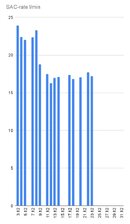So far there have been many good and very good proposals and the videos of Blackcrusader .
On these videos we see a diver who exhales a good amount of bubbles in a short time after a long breathold . We do not hear the inhalation, but it will probably be as long (or short) as the exhalation.
This is anything but like " first rule of scubs diving is never hold your breath " but there are good reasons why this way of breathing is so effective .
Let's assume that : 1.) the strongest respiratory stimulus is the PPCO2 in the body and thus also in the lungs.
2.) Our body body produces a constant rate of CO2 .
The PPCO2 in the lungs depends only on the total pressure and CO2 concentration, not on the amount of air in the lungs.
When we start exhaling depends on the CO2 concentration, no matter how full or empty the lungs are.
Exhalation changes the total amount of CO2 in the lungs, but not the CO2 concentration.
In order to effectively reduce CO2 concentration, the residual air remaining after exhalation must be diluted by the amount of inhaled air.
After inhalation (CO2 dilution), the greater the volume of air in the lungs, the slower the CO2 concentration will increase.
If you now bring all the influences together, the most effective breathing consists of deep exhalation, deep inhalation , breathold deep exhalation ........
The average CO2 level is medium, because it is approximately in the middle between the lowest possible value and the respiratory stimulus threshold.
Unfortunately, there are problems to realize this breathing in practice,
because the human being is not a machine.
Being able to breathe deeply with perseverance requires practice and relaxation at the same time. You can also practice this on land.
Nevertheless, when diving, you should only breathe as deeply as is comfortable and relaxed.
A bigger problem is the inhaled breath holding .
When the airway is blocked, anything that compresses the diver can create pressure in the chest cavity, thus disturbing blood circulation and the diver's relaxation. This can be a tense respiratory muscles, a tight diving suit, straps or a BCD. It may be enough to breathe in a little less deeply. If you don't feel comfortable with the breathold, then insted exhale slowly. A diver who does not feel comfortable will never breathe effectively.
The most important thing is whether you like these breathing pauses or not.
There are pictures of the happy submerged breathold babies. Are you such a baby ?
What is predisposition and what can you train? Everyone will have to try that out for themselves, and my recommendation as usual is freediving.




